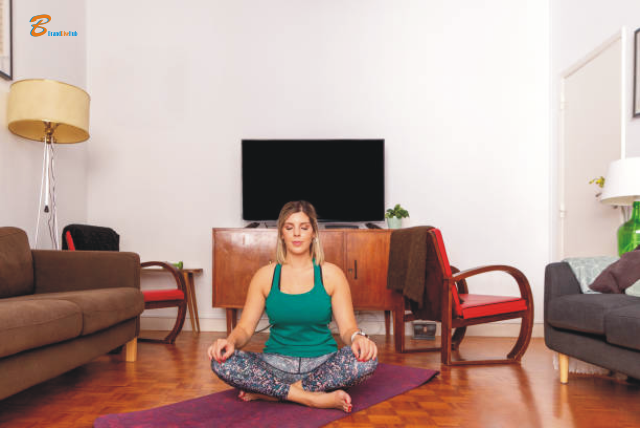10 Proven Yoga benefits for mental health and relaxation | 2025
Contents
- 1 Introduction
- 2 Psychological Benefits of Yoga benefits for mental health and relaxation
- 3 How to Use Yoga to Improve Mental Health and Relaxation
- 4 Why Is Yoga So Good for You?
- 5 FAQs About Yoga Benefits for Mental Health and Relaxation
- 5.0.1 1. What are the main mental health benefits of yoga?
- 5.0.2 2. How does yoga promote relaxation?
- 5.0.3 3. Can yoga help with anxiety and depression?
- 5.0.4 4. How often should I practice yoga to see mental health benefits?
- 5.0.5 5. Which yoga poses are best for mental health?
- 5.0.6 6. Does yoga work for people who are new to mindfulness practices?
- 5.0.7 7. Can yoga improve sleep quality?
- 5.0.8 8. How does yoga compare to other relaxation techniques?
- 5.0.9 9. Can yoga help with work-related stress?
- 5.0.10 10. Is yoga suitable for all ages and fitness levels?
- 5.1 Summing Up the Yoga Benefits for Mental Health and Relaxation
- 5.2 Share this:
- 5.3 Like this:
Introduction
In today’s fast-paced world, stress and mental fatigue have become a part of daily life. This makes mental health and relaxation more important than ever. Yoga offers a holistic solution, blending physical movement, controlled breathing, and mindfulness to foster a sense of inner peace. The yoga benefits for mental health and relaxation are not just theoretical. Scientific studies and centuries of practice support them. You might want to ease anxiety. Perhaps you aim to improve focus. Or you could be seeking a moment of calm amidst chaos. Yoga provides a transformative pathway to balance and well-being. In this guide, we’ll explore how integrating yoga into your routine can significantly enhance mental clarity and emotional resilience.
Psychological Benefits of Yoga benefits for mental health and relaxation
The yoga benefits for mental health and relaxation significantly enhance psychological well-being. They offer a profound impact on how we process emotions. Yoga also aids in coping with stress. One of the most notable effects of yoga is its ability to reduce anxiety and depression. Yoga combines mindful breathing techniques with gentle movements. This combination helps lower cortisol levels, which is the body’s primary stress hormone. It promotes a sense of calm and control.
Regular yoga practice enhances self-awareness and mindfulness, allowing individuals to understand their emotions and reactions better. This heightened awareness can help in managing negative thought patterns and fostering a more positive outlook on life. Additionally, yoga has been shown to improve cognitive functions. These include memory and focus. Chronic stress and mental fatigue often impact these functions.
The practice fosters a sense of community and support through group sessions or yoga retreats. These activities can reduce feelings of isolation. They boost overall happiness. These yoga benefits for mental health and relaxation are remarkable. They make it a powerful tool for anyone looking to strengthen their psychological resilience. Yoga also helps achieve inner harmony.
How to Use Yoga to Improve Mental Health and Relaxation
Harnessing the yoga benefits for mental health and relaxation requires consistency, intention, and the right techniques. Here are some actionable steps to integrate yoga into your daily routine and maximize its mental health benefits:
1. Start with Breathing Techniques (Pranayama)
Breathing exercises are foundational in yoga and essential for calming the mind. Techniques such as alternate nostril breathing (Nadi Shodhana) and diaphragmatic breathing can reduce stress and bring a sense of relaxation. These exercises promote oxygen flow to the brain, helping to alleviate anxiety and improve focus.
2. Incorporate Restorative Yoga Poses
Certain poses are specifically designed to calm the nervous system. Child’s Pose (Balasana), Corpse Pose (Savasana), and Legs-Up-The-Wall (Viparita Karani) encourage relaxation. They help release tension from the body. Practicing these regularly amplifies the yoga benefits for mental health and relaxation by soothing both mind and body.
3. Practice Mindfulness with Meditation
Combine yoga with mindfulness meditation to enhance its mental health impact. During yoga sessions, focus on your breath and movements, letting go of intrusive thoughts. Post-yoga meditation can deepen your relaxation and help you build emotional resilience over time.
4. Create a Regular Routine
Consistency is key to experiencing the full yoga benefits for mental health and relaxation. Practice for at least 15–30 minutes daily. Choose morning for a fresh start or evening to unwind.
5. Join a Supportive Yoga Community
Participating in group classes or virtual sessions can foster a sense of connection and motivation. Sharing the journey with like-minded individuals enhances the psychological benefits of yoga, reducing feelings of isolation and increasing emotional well-being.
6. Focus on Gratitude and Positive Affirmations
As you finish your yoga practice, take a moment to reflect on what you’re grateful for. Pairing yoga with positive affirmations reinforces mental health benefits and sets a tone of positivity for the day.
Why Is Yoga So Good for You?
Yoga is celebrated worldwide for its transformative effects on both body and mind. The practice combines movement, mindfulness, and breathwork, creating a holistic approach to health and wellness. Here’s why yoga is so beneficial:
1. Supports Mental Health
One of the most significant reasons yoga is so good for you is its impact on mental well-being. By reducing stress hormones and fostering mindfulness, yoga promotes mental clarity and emotional resilience. This aligns perfectly with the yoga benefits for mental health. It helps with relaxation by alleviating anxiety, depression, and other mental health challenges.
2. Enhances Physical Flexibility and Strength
Yoga strengthens and stretches your muscles, improving physical flexibility and posture. Unlike high-impact workouts, yoga is gentle yet effective, making it accessible to all fitness levels.
3. Improves Respiratory and Cardiovascular Health
The controlled breathing techniques used in yoga enhance lung capacity. They improve oxygen flow. This can lower blood pressure and reduce heart strain. These benefits make yoga a powerful ally for a healthy cardiovascular system.
4. Encourages Mind-Body Connection
Yoga’s integration of physical movements with mindfulness promotes a deeper connection between mind and body. This harmony fosters a sense of inner peace. It creates balance that enhances the yoga benefits for mental health and relaxation.
5. Boosts Sleep Quality
Regular yoga practice helps relax the body and calm the mind, which is especially helpful for those struggling with insomnia. Restorative poses and evening yoga routines can lead to better and more restful sleep.
6. Fosters Emotional Resilience
By encouraging self-reflection and mindfulness, yoga helps practitioners better navigate life’s challenges. It provides tools to stay grounded and resilient during difficult times, enhancing overall emotional health.
7. Accessible to Everyone
Yoga is adaptable for all ages, fitness levels, and health conditions. Whether you’re a beginner or an advanced practitioner, yoga offers personalized benefits that suit your unique needs.
FAQs About Yoga Benefits for Mental Health and Relaxation
1. What are the main mental health benefits of yoga?
Yoga helps reduce stress, improve focus, enhance emotional resilience, and alleviate symptoms of anxiety and depression. It promotes mindfulness and self-awareness, creating a sense of inner peace and relaxation.
2. How does yoga promote relaxation?
Yoga combines deep breathing, gentle movements, and mindfulness, which help calm the nervous system. This reduces the production of stress hormones like cortisol and encourages relaxation.
3. Can yoga help with anxiety and depression?
Yes, yoga has been proven to lower anxiety and depression symptoms. It increases the production of feel-good hormones like serotonin and dopamine. Yoga also reduces stress hormones.
4. How often should I practice yoga to see mental health benefits?
Practicing yoga 3–5 times a week for at least 20–30 minutes can significantly enhance mental health and relaxation. Consistency is key to experiencing long-term benefits.
5. Which yoga poses are best for mental health?
Poses like Child’s Pose (Balasana), Corpse Pose (Savasana), and Legs-Up-The-Wall (Viparita Karani) improve mental health. Cat-Cow Pose (Marjaryasana-Bitilasana) aids in relaxation.
6. Does yoga work for people who are new to mindfulness practices?
Absolutely! Yoga is an excellent starting point for mindfulness. It combines physical movement with breathing and meditation. This makes it accessible for beginners.
7. Can yoga improve sleep quality?
Yes, yoga is known to improve sleep by calming the mind and relaxing the body. Evening yoga routines and restorative poses can be particularly effective in promoting restful sleep.
8. How does yoga compare to other relaxation techniques?
Unlike many relaxation techniques, yoga combines physical activity with mindfulness, offering a more holistic approach to mental health and relaxation.
Yes, yoga is highly effective for managing work-related stress. Practicing yoga during breaks or after work can help clear the mind, reduce tension, and improve focus.
10. Is yoga suitable for all ages and fitness levels?
Yes, yoga is highly adaptable and can be tailored to suit all ages and fitness levels. From gentle yoga for seniors to advanced practices for seasoned yogis, there’s something for everyone.
Summing Up the Yoga Benefits for Mental Health and Relaxation
Yoga is a powerful practice that offers numerous benefits for both mental and physical health. It helps alleviate stress, anxiety, and depression by fostering mindfulness, relaxation, and emotional resilience. With its unique combination of breathing techniques, mindful movement, and meditation, yoga promotes deep relaxation and improves overall well-being.
Regular practice can enhance mental clarity, improve sleep, and help you navigate life’s challenges with greater emotional balance. Yoga offers a wide range of tools to boost mental health. It encourages relaxation through calming poses like Child’s Pose and mindfulness-enhancing practices.
Whether you are new to yoga or an experienced practitioner, incorporating yoga into your daily routine is beneficial. It is an excellent way to experience the profound yoga benefits for mental health. It also aids in relaxation. By committing to this practice, you can unlock a deeper connection between mind and body. This commitment ultimately improves your quality of life.











One Comment